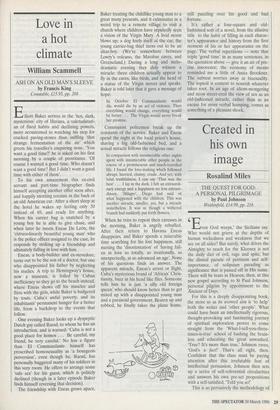Love in a hot climate
William Scammell
ASH ON AN OLD MAN'S SLEEVE by Francis King Constable, £15.95, pp. 208 Elliott Baker arrives in the 'hot, dark, mysterious' city of Havana, a valetudinari- an of fixed habits and declining powers, more accustomed to watching his step for cracked paving-stones than sniffing 'that strange fermentation of the air' which greets his traveller's enquiring nose. 'You want a good time?' he is asked on his first morning by a couple of prostitutes. 'Of course I wanted a good time. Who doesn't want a good time? But I didn't want a good time with either of them'.
To his own amazement this ex-civil servant and part-time biographer finds himself accepting another offer soon after, and happily snorting cocaine in the back of an old American car. After a short sleep at the hotel he wakes up feeling only 50 instead of 69, and ready for anything. When his carrier bag is snatched by a young boy he is able to give chase, and when later he meets Eneas De Leon, the 'extraordinarily beautiful young man' who is the police officer assigned to the case, he responds by striking up a friendship and ultimately falling in love with him.
Eneas, a body-builder and ex-stevedore, turns out to be the son of a doctor, but one who disappointed his father by neglecting his studies. A trip to Hemingway's house, now a museum, is foiled by Cuban inefficiency so they go to the beach instead, where Eneas shows off his muscles and flirts with the girls, while Baker is badgered by touts. Cuba's awful poverty, and its inhabitants' permanent hunger for a better life, form a backdrop to the events that follow.
One evening Baker looks up a dyspeptic Dutch gay called Raoul, to whom he has an introduction, and is warned: 'Cuba is not a good place for homos . . . Be careful, my friend, be very careful.' No less a figure than El Commandante himself has proscribed homosexuality as 'a bourgeois perversion', even though he, Raoul, has personally buggered many of his soldiers in this very room. He offers to arrange some 'safe sex' for his guest, which is politely declined (though in a later episode Baker finds himself reversing that decision).
The friendship with Eneas grows apace, Baker treating the childlike young man to a great many presents, and it culminates in a weird trip to a remote village to visit a church where children have reputedly seen a vision of the Virgin Mary. A livid storm blows up; a dog hurls itself at the car, the young carrier-bag thief turns out to be an altar-boy. (We're somewhere between Lowry's volcano, the Marabar caves, and Greeneland.) During a long and melo- dramatic evening they duly witness a miracle: three children actually appear to fly in the caves, like birds, and the head of a statue of the Virgin moves and speaks. Baker is told later that it gave a message of hope: In October El Conunandante would die, would die by an act of violence. Then everything would change, everything would be better . .. The Virgin would never break her promise.
Communist policemen break up the remnants of the service. Baker and Eneas spend the night at the local priest's house, sharing a big old-fashioned bed, and a sexual miracle follows the religious one: In comparison with innumerable other nights spent with innumerable other people in the course of a promiscuous and much-travelled life, I found the love-making which followed abrupt, hurried, clumsy, crude. And yet, with total truthfulness, I can say 'That was the best' .. . I lay in the dark. I felt an extraordi- nary energy and a happiness no less extraor- dinary. Wilagro', Diego had said of what happened with the children. This was another miracle, smaller, yes, but a miracle nonetheless. It was as though a withered branch had suddenly put forth flowers.
When he tries to repeat their caresses in the morning, Baker is angrily rebuffed. After their return to Havana Eneas disappears, and Baker spends a miserable time searching for his lost happiness, still nursing the 'disorientation' of 'having fall- en in love so totally, so irrationally, so unexpectedly, at so advanced an age'. None of his questions finds an answer. The apparent miracle, Eneas's arrest or flight, Cuba's mysterious brand of 'African' Chris- tianity, buzz in his head like flies. Someone tells him he is just 'a silly old foreign queen' who should know better than to get mixed up with a disappointed young man and a paranoid government. Beaten up and robbed, he finally takes the plane home, still puzzling over his good and bad fortune.
It's rather a four-square and old- fashioned sort of a novel, from the allusive title to the habit of filling in each charac- ter's appearance and history from the first moment of his or her appearance on the page. The verbal repetitions — note that triple 'good time' in as many sentences, in the quotation above — give it an air of pre- cise innocence; the economy of means reminded me a little of Anita Brookner. The subtext worries away at bisexuality. The topsoil is content to nourish whatever takes root. In an age of idiom-mongering and neon street-cred the view of sex as an old-fashioned miracle, rather than as an excuse for more verbal humping, comes as something of a pleasant shock.


























































 Previous page
Previous page